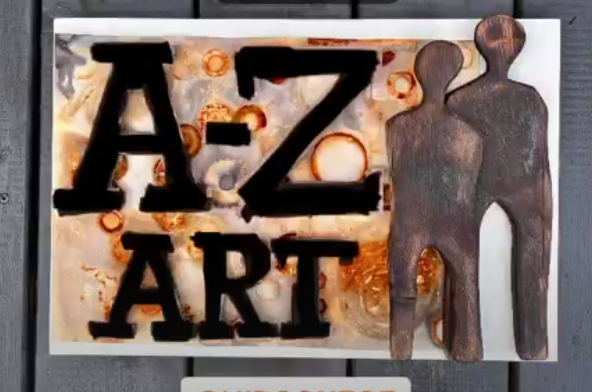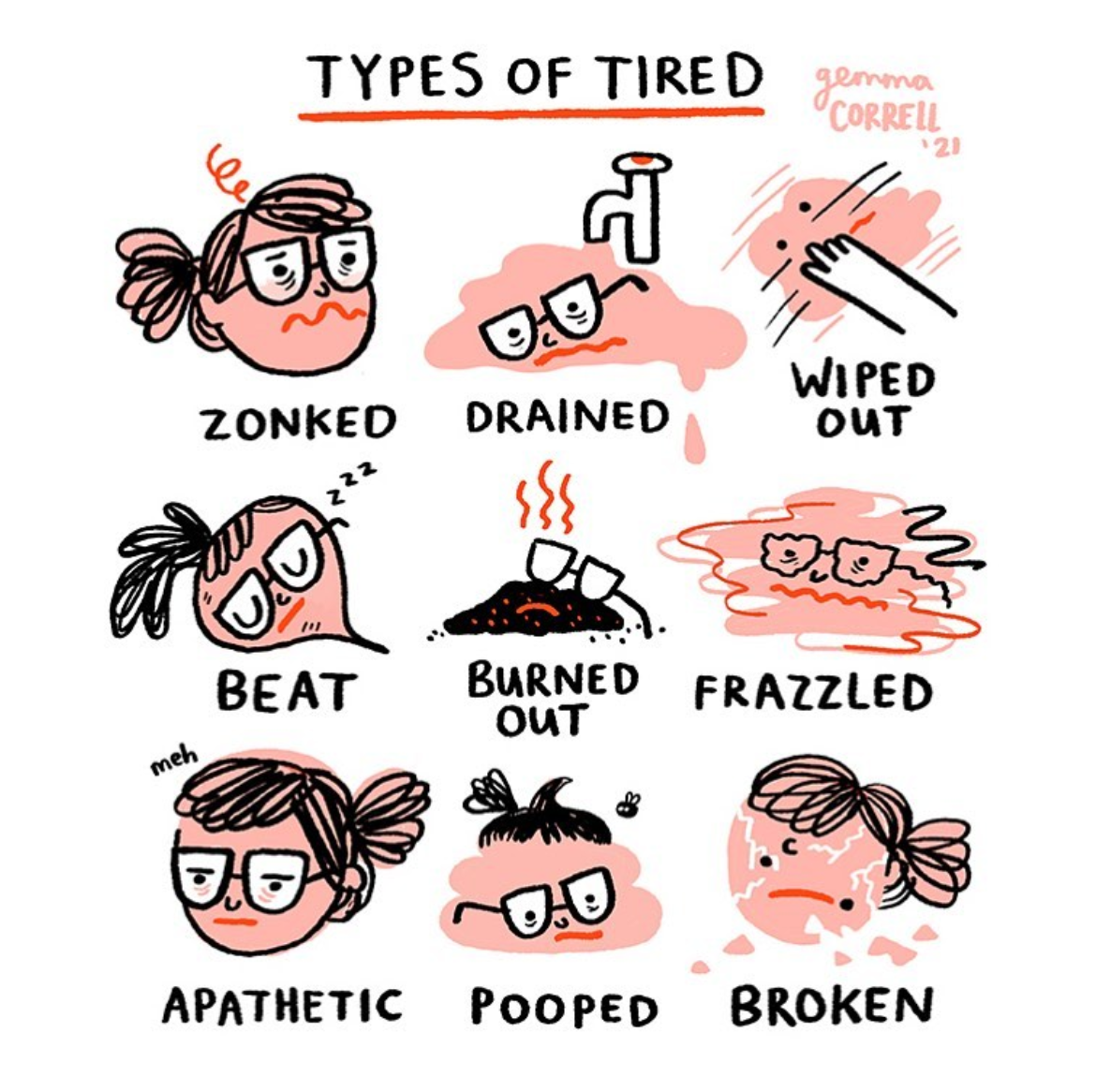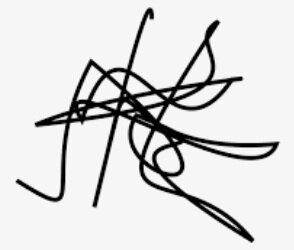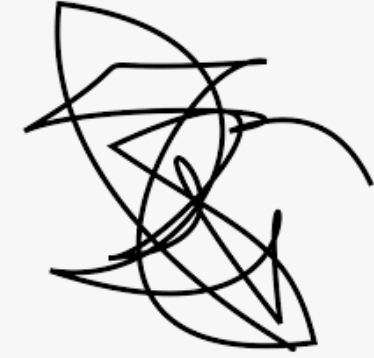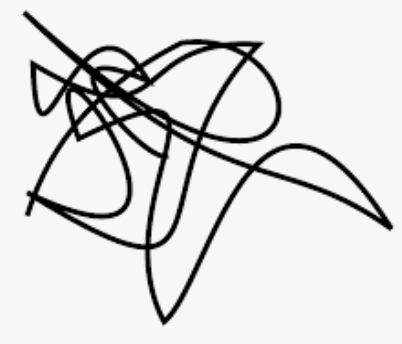Tired
How tired are you?
A reflection on how "tiredness" became a tool to help me maintain my mental health.
I’ve been tired lately and as I write here it occurs to me that “tired” is a word with layers of meaning. A few weeks back, I saved this info graphic by the talented gemma Correll and find it a helpful structure for my reflection as I attempt to peel my way through the layers to my inner truth.
illustration by Gemma Correll
Like most people during these pandemic times, I tend to cycle through emotions like I’m strapped to a roller coaster.
If I think deeper, I find that I’m moving through the different types of tired as well; except it feels more like being yanked back and forth, up, down and all around by the universe while it scribbles; dragging my soul with it through the days.
As a former teacher, tired is a word I’m well acquainted with. Like other service professions, it’s a job that can drain you; particularly if you aren’t skilled at setting boundaries. It was not uncommon for me to take work home at night and spend several hours revising plans for the next day, grading papers or adjusting materials for the individual learning needs of students. Weekends always involved trips into my classroom to organize materials or update bulletin boards and my car was not the only one in the parking lot. For many years, I managed this level of intensity. I didn’t enter into the profession naive to the rigor required; both of my parents were teachers and it was something I had a deep passion for which helped to sustain me through long days and extended hours that often left me completely beat by Friday night.
When my career of 27 years came to an unexpected end, a question I was asked often by well meaning friends and colleagues was whether or not I had become “burned out”. It was a question I asked myself, too, though I always answered “no”. Burn out was something nobody wanted to end up with; not only because of the toll it could take on you personally but how easily it cold impact the children and families you worked with. It was common for teachers to be aware of the danger of it, but not something we ever directly helped each other with or received support or information about from supervisors or support groups like our teacher’s union. To be honest, I don’t think I really knew what to look for and as a perfectionist, it was something I would not have had an easy time accepting help with anyway.
Looking back on my last five years as a teacher, I now see that I was most definitely burned out, though I can’t say for certain exactly when I crossed the line from being exhausted to the more empty space of apathy.
The changes to the job since I had begun, combined with a lifelong battle with perfectionism converged with an intense succession of personal challenges to create a perfect storm that left my career in ruins and pieces of my identity scattered for miles; not unlike the aftermath of a hurricane.
This blog post has taken me two weeks to compose in part because I struggle with how much depth to dive into the storm. So many things swirled about during that time, I discovered that it was difficult to separate them out in the retelling. Each new draft took me down a different path of emotion that often converged into a murky swamp of feelings that in itself was exhausting to navigate. As I wrote, I found many roots still wound tightly around open wounds; which surprised and disappointed me with the intensity of pain that came coursing to the surface as I attempted to describe them.
Sometimes I expect that the safety of space and time will protect me from the hurt. Yet, I’m learning that they alone are just band-aids if the hurt has been suppressed and not allowed to flow freely. It festers like an infected wound that was never properly dressed.
The loss of my career as a teacher coincided with the premature transition of my parenting role. I don’t want to give the impression that I wasn’t expecting my son to ever grow up and become independent. When I signed up to parent, I knew it ended with an “empty nest”; one that my child would fledge himself from if I did my job well enough. In fact, like all parents, it was my sincere wish and dream to give my son the experiences and support and love necessary to strengthen his wings for that day.
AND here is where things get complicated because things didn’t progress along a familiar continuum after my son’s adoption. Early on, roads diverged and I was able to keep up through many of the splits and twists and turns, though I see now, each one brought me further and further from my comfort zone and depleted fuel from my emotional tank. As my peers and friends seemed to be continuing down the straight path navigating a few bumps, I felt more and more isolated by my experiences and in hindsight I can see how those feelings along with my own undiagnosed anxiety led me to lose my way.
I persevered trying my best to find my way back to familiar territory, yet , I was reluctant to ask for directions; desperate to prove my parenting prowess. When I got really lost, I eventually did reach out for support, but by then, I was too frantic and frazzled to see clearly and no longer able to drive safely and my relationship with my son suffered because of it.
Ultimately, when my son ended up leaving the nest at the start of his high school years instead of the end, I abandoned the car entirely and wandered off into the wilderness alone, my only partners being shame, blame and apathy.
They’ve got big personalities, that trio of emotions , and I found it difficult to resist the gravitational pull of their frequent soap box soliloquies; spouting on about how my shortcomings and lack led to rejection and failure. In fact, a whole new level of exhaustion seemed to settle over me and I just wanted to lie down and let go. It had all become too heavy and hard. I felt completely broken and no longer had sight of anything familiar to help guide me in putting myself back together again. Not only had some pieces completely disappeared, the box top had gone missing, too!
I’m not really sure what it was that prevented me from letting go completely. Perhaps it was a silver lining that my perfectionism had a grasp on life instead of death; stubborn in its perseverance to find a way to make it all work. Maybe it was the fact that I wasn’t physically strong enough to successfully pull my hulking body up high enough to reach the loop of rope from the swing in our backyard the day I gave into an impulse. I like to think it was the gifted skill of the counselor I was seeing at the time who could hear the whisper of the tiny voice inside myself that knew there was more to be done here in this life; even if I couldn’t hear my own wisdom in maw of the storm. Somehow she found a way to reach toward me in a moment when I felt as if everyone and everything had fallen away. And it was her steady, consistent witness to my pain that kept my eyes open, even if I couldn’t bring myself to see with them just yet. I kept going back and for a while that’s all I did; show up in her office a couple of times a week hanging on.
Eventually, something shifted and my senses slowly came back on line, though the experience had rebooted my navigation system. I discovered that the “rerouting” resulted in my discovery that there was much to be seen off the beaten path and that perhaps the way forward was not to find a way back to the familiar but to forge a new route onward into unknown territory.
And that’s what I’ve been doing. Traveling this way comes with its own twists and turns; often my internal compass still gives me mixed signals about which way is “north” and I get confused and worry that maybe I’ve lost my way again.
For me, feeling tired is a message and signpost that I have gotten off track and instead of pushing through and pretending I have it all together, (I know where that path leads) I have to remind myself to pull over to a rest stop until things quiet down so I can hear my “true north” whisper. She always knows which way to go.
Sometimes that means reaching out for help (It might be time for me to pick up regular counseling sessions again).
Other times it just means allowing myself more grace when reflecting on my past experiences and mistakes. Choosing kindness among the storm of negative messaging and flags of regrets the army of ANTS ( Automatic Negative Thoughts) like to wave in their assault is a challenge for me, so staying connected is important so I can have the eyes and ears of friends to remind me of what’s fact and what’s fiction. I’m absolutely grateful that they amplify my inner voice when it gets loud and windy.
Always, I find respite in walking in nature and immersing myself in the beauty of small moments and details of the world around me. Not just the obvious bright colors and sunny moments, but the wabi sabi discord of the imperfect, too. It reminds me that there is beauty everywhere and in everything, not just the “pretty” parts of the world (or ourselves)
Art making also provides a much needed release. Involving my whole body in the creative process helps big feelings to remain fluid encouraging them to move through me as opposed to becoming stuck where my natural tendency is to bury them and escape altogether.
Writing is also a key element of my self care, as well. When I find myself in the midst of complex emotions, I often write my best poetry; finding safety and comfort in the process of searching for just the right words to describe my feelings as I experience them; preventing me from getting flooded by their intensity.
Setting up a network of support for my mental health has been paramount to my survival and success. Sometimes I wonder, looking back over the times I struggled, how my suffering might have been eased were there not such a stigma around asking for and receiving help when life gets overwhelming. Even now, finding a label that isn’t shaming for the time I spent “off line” during the aftermath of losing my job and going through personal and parental challenges is hard. I find it difficult to name what happened in a way that is respectful and supportive to my journey and growth while using words like “mental or nervous breakdown” or “going crazy” . They only perpetuate negative stereotypes and strengthen barriers for those of us navigating mental illness.
If this blog post resonated with you, or you want to share which kind of “tired” you are today, I’d love to hear from you. Please visit me over on Instagram and send me a DM or reach out through the e-mail found in the contact section of this site.
